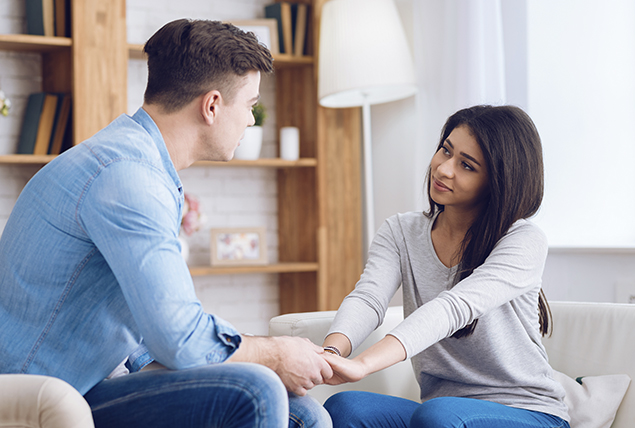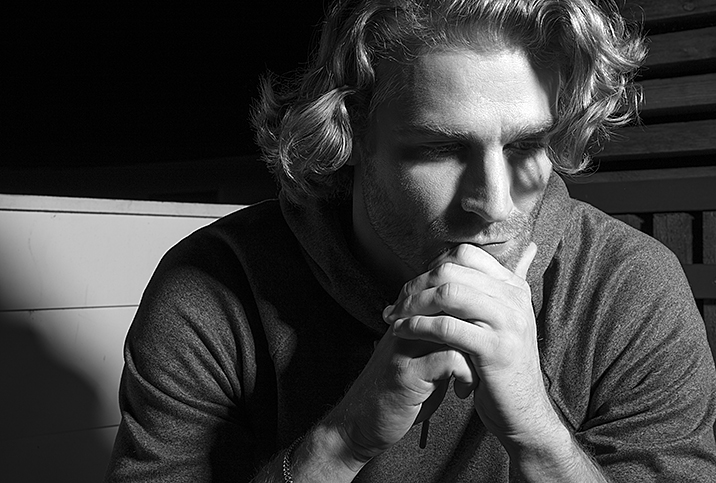How Can I Help My Partner With Anxiety About Erectile Dysfunction?

Twenty-three-year-old Liam had been struggling with erectile dysfunction (ED) for a few months. He initially feared his testosterone was low, so he sought a medical evaluation. It revealed he was one of many men who have ED without low testosterone (low-T). He then suspected his erectile difficulties were due to anxiety.
Liam, whose last name is withheld for privacy concerns, was embarrassed when he finally told his girlfriend about his ED. He imagined it would have been better to have low-T than to have to admit the ED was linked to his anxiety.
To his relief, his partner was understanding and compassionate. She reassured him it was nothing to be ashamed of and that they could work together to find a solution.
His partner suggested they see Tom Murray, Ph.D., a sex therapist in Greensboro, North Carolina, and explore the options available to them. His partner's kindness and support were a huge comfort to Liam and helped him feel less alone in his struggle.
ED caused by anxiety is common. To deal with it, the man and his partner should first educate themselves about normal sexual functioning, according to Murray, author of the book "Making Nice With Naughty: An Intimacy Guide for the Rule-Following, Organized, Perfectionist, Practical and Color-Within-the-Line Types."
"Dicks aren't dildos; they don't work on demand," Murray said. "Sometimes they don't get hard when a man wants it to get hard. This is a fact of life and happens to nearly all men at some point or another. When men and their lovers understand it, they're less likely to take it personally and catastrophize about it happening again."
It's helpful for men who struggle with anxiety-induced ED to have a partner who is patient, validating and communicative, said Robyn Flores, L.M.F.T., L.P.C., a sex therapist and doctoral candidate who provides client care in Texas and Colorado for Respark Therapy.
"This includes the partner not taking the erectile difference personally," Flores explained. "Coming to a common understanding that the ED is a difference, not necessarily a deficit or a dysfunction, and reframing the word 'performance' to 'experience' can cause a shift in perspective."
How can couples have sex beyond intercourse?
Sharing feelings of love toward your partner's body can be helpful, according to Laurin Lewis, M.A., a licensed professional counselor associate in Austin, Texas.
"A penis-haver can please their partner in many different ways that do not need to include an erect penis," Lewis said. "Empowering their partner to find new and exciting ways to achieve pleasure can take away some of the pressure, thereby relieving some anxiety."
For many women in relationships with a man, penile-vaginal intercourse is not the most pleasurable way of having sex, according to sex therapist Bat Sheva Marcus, L.C.S.W., Ph.D., author of "Satisfaction Guaranteed: How to Have the Sex You've Always Wanted."
A lot of women derive more pleasure from receiving oral sex, for instance, due to the clitoral stimulation involved.
"Many women are very happy to have sex in other ways if [the man] can come to terms with the fact that there are other ways to have sex," Marcus said. "They have 10 fingers, 10 toes, a mouth, which actually may be a more pleasurable experience for their partner."
It can be incredibly helpful if the partner says they want to take intercourse off the table for the next several sexual encounters, Marcus added. During these sessions, they can take part in oral sex or mutual masturbation or make use of a vibrator.
"That takes the pressure off dramatically and can often turn things around by itself," she said.
Murray once had a patient with anxiety-induced ED express that he feared he would not be able to get an erection. Murray asked him to stick up his index and middle fingers.
"I said, 'Now, make them as rigid as possible,'" Murray said. "I told his wife, 'Now, I want you to try to bend them without hurting him.' She tried, and he successfully resisted her. I responded to him, 'See, no matter how anxious you are, you still have two strong fingers. Give them a go.'"
On occasion, Murray asks clients with anxiety-induced ED to purchase strap-on dildos.
"Often, they resist the idea, thinking it will be even more humiliating," he said. "However, every man who's taken my recommendation found that when they wore the dildo, they got an erection. Why? Because there was no pressure. They can have fun with their partner using the dildo or with their own penis, should it stand to attention. Sex is about fun and pleasure. Whatever it takes to get you there is what matters."
Don't say or do these things to your partner
As with many problems in relationships, confronting a man's anxiety-induced ED as a united front is key, according to Lewis.
"Understanding and compassion is most helpful while reinforcing the love shared between partners," Lewis said. "The old adage 'Think before you speak' fits in well here."
It is unhelpful and unproductive when a partner blames the man with anxiety because their body is not responding the way they want it to, Flores said.
"It creates disconnection," she explained.
"Blame is really bad," Marcus said. "I think jumping to assume the guy has been watching too much porn and masturbating too much is really not helpful. Trying to assume all the reasons why is not helpful."
Blaming and shaming are the two worst things a partner can express to the man with ED because it continues the cycle of anxiety, Marcus said.
Yes, verbally articulate that it is fine if there's a period when their erections are not as reliable—but don't say it in the bedroom.
"It is never, ever good to have a referendum on your sex life as you are having sex," Marcus said. "There's no way to say something where the person doesn't feel judged if you have just had sex."
Instead, Marcus suggested having a conversation during breakfast or dinner.
"Say, 'I want to have a conversation about our sex life. I noticed recently it's harder for you to have erections. That's fine. I'm really fine with it. I feel like you're getting more and more anxious about it, and I don't care. Not only do I not care, but there are other ways to have sex,'" Marcus said.
Murray stressed that the partner must not take it personally when the man is experiencing anxiety-induced ED.
"They shouldn't infer that the lack of an erection is a reflection of their attractiveness," he said, adding that they should also never insinuate that their lover is confused about their sexual orientation.
Murray advised men with erectile difficulties to lean into their anxiety.
"Do not stop pursuing your partner out of fear that you'll be humiliated again," he said. "Each time you avoid sex and intimacy, you're feeding the anxiety monster."
Don't let anxiety build to the point where it dominates your day-to-day life, including your sex life.
If you think professional therapy might be what your relationship needs but you don't know a therapist, telehealth can help. Giddy Telehealth takes the difficulty out of the search. The easy-to-use online service provides access to hundreds of healthcare professionals who have expertise across the full scope of medical care, including couples therapy.


















